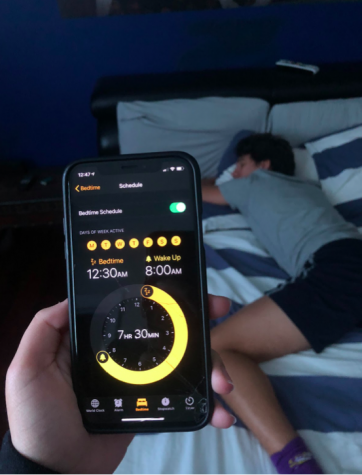6 Tips for a Better Night’s Rest
April 22, 2020
Getting a good night’s sleep is something many teenagers struggle with. With the shift to remote learning for students across the nation, many are experiencing disruptions to their sleep schedule, especially as a result of increased exposure to blue light from screens all day. A good night’s rest is also an important factor to keeping a healthy immune system. Here are a few tips about what to do before going to bed to ensure a good night’s sleep.
Turn off electronics at least 15 to 30 minutes before going to bed
Reducing blue light exposure is crucial since it tricks your body into thinking it’s daytime. Although exposure to light during the day is beneficial, it has the opposite effect at nightime. There are several methods to help reduce the amount of nighttime blue light exposure, such as wearing glasses that block blue light, downloading an app (such as f.lux) to block blue light from your device, or simply turning off any bright lights, television, or electronics for about an hour before going to bed.
Only consume caffeine in the morning/early afternoon
Studies have shown that consuming any kind of caffeine 6 hours prior to going to bed makes sleeping more difficult and less . Therefore, it is highly suggested to not have any caffeine after 3-4 p.m. ┬ĀCoffee stimulates your nervous system and may stop your body from naturally relaxing at night.

Creating a regular bedtime schedule is an important factor to having a better night’s rest. Try using an app like Bedtime, which comes for free on Apple devises, to track how many hours you sleep each night, as well as control your morning alarms.
Try and reduce taking long naps during the day┬Ā
Taking long naps during the day can negatively affect your nighttime sleep. While studies show that napping for 30 minutes or less has health benefits and enhances brain activity, longer naps affect health and sleep quality throughout the night. Also, getting in a routine of taking daytime naps will make you more tired during the day, messing with your internal clock and confusing your body when it’s time to go to bed at night.┬Ā
Set your bedroom temperature
Room temperature has a great effect when it comes to getting a good night’s sleep. Sleeping in a warm environment should be avoided when going to bed, and try cooling the temperature in your room by a free degrees at bedtime. Bedroom temperature has more of an effect than external noise when it comes to getting good sleep. Although everyone has a different preference, having your air set to 70 degrees Fahrenheit (20 degrees Celsius) seems to be a comfortable temperature for most people.┬Ā
Eat at regular times
A high-carb meal eaten hours before bed is beneficial, but consuming a large meal before falling asleep can lead to poor sleep while disrupting your hormones as well. Carbs are not always necessary though. One study has shown that a low carb diet improves sleep.
Relax and meditate
Having a nighttime routine can help with organization and keeping your room clean and cozy setting a vibe for a good sleep. One remedy is taking a relaxing bath or shower. A study showed that taking a hot bath or shower 90 minutes before sleeping helps you fall into a deeper sleep. Meditation, reading a book, listening to relaxing music or a podcast for bed are also all beneficial and contribute to getting good sleep.
















